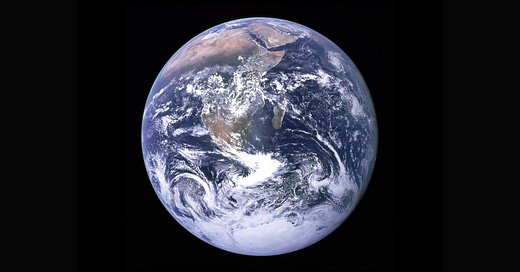I don't wanna feed the world anymore.
Prime Future 103: the newsletter for innovators in livestock, meat, and dairy
My friends. I have resisted writing this for a while but alas, here we are.
I recently saw a tweet that said:
The American farmer wakes up every day, and goes to bed every night thinking "How do I compete and leverage technology to feed 9B people by 2050".
I’m not picking on that tweet, this sentiment is errrrywhere in ag. Founders love to pitch their startups under this context as proof that their startup will be a multi-billion dollar business. Venture funds raise capital based on this. Agribusiness loves to use this framing to recruit talent and rally the troops. Trade associations love to use it to make their members feel good about themselves.
It's the nebulous & lofty industry rah rah. Need a cheer to lead? Feed the world is the golden standby. Old Faithful.
But let’s talk about why this mantra is irrelevant and flawed…and why that matters.
Why we started Feeding the World in the first place
In 2009 the Food and Agriculture Organization of the United Nations released it’s report saying:
According to the latest UN projections, world population will rise from 6.8 billion today to 9.1 billion in 2050 - a third more mouths to feed than there are today. (Creating the need to) produce 70 percent more food for an additional 2.3 billion people by 2050.
What else did the report say though? It talked about the complexity of accomplishing this from considerations for production (water & land use & availability) to considerations for lifting more people out of poverty (from investment in rural infrastructure across Africa to increase access to food to the prediction that 70% of people will live in urban areas by 2050 up from 49% today). Not to mention the changes in demand for different types of food as incomes rise, and the role of policies around biofuels and how that will impact commodity prices.
Oof, that’s a lot of complexity and competing dynamics among really really hard problems.
If you think about the scale and complexity and geopolitics and cultural trends involved in the global food industry, it’s almost intellectually insulting that we’ve boiled it all down to ‘feed the world’.
7 flaws with dumbing it all down to Feed the World
The market’s job is to solve for m-o-r-e through price. Markets have 1 job, and this is it. Nobody needs to suggest producing more, the market will do that.
Supply is more than just production. Producing enough food for x billion people is one part of the supply side of the equation. There’s also the question of distribution & getting the right food to the right markets at the right time. And then there’s the question of how to minimize food waste, whether in field/barn, in transit, in grocery store/restaurant, or in the home. But talking about reducing waste isn’t nearly as fun as talking about increasing production so here we are.
Demand is a moving thing. On the other side of the price equation is demand. What do people want? What are they willing to pay for? What do they have access to? Food tastes and preferences change over time and chances are pretty doggone strong that preferences will look differently in 2050 than they do today.
Other things matter besides quantity. Feeding the world is a commodity message. Higher yield. More throughput. Yield at any cost. Feed the world assumes you can high yield your way to profitability which isn’t always the case. But it also misses what's happening in the real world where yes, the underlying market incentive is always for quantity of production but there's increasingly market opportunities & incentives for producers who are optimizing for quality, and/or specific attributes.
Feed the world has also been weaponized to defend certain production practices. “If we can’t do xyz or use abc then we can’t feed the world!” But it’s usually not true, is it?
Producers figure it out and the market sorts it out.As one cattle feeder recently said ‘my entire career people have been saying this or that is going to put this industry out of business, but it never does.’The World is neither a market nor a customer. Even the most mega of mega farms aren’t feeding the world; they are supplying some percentage of some raw materials to some specific supply chains for some specific food items for some specific customers. Not to mention that you could milk tens of thousands of cows and yet still only supply an itty bitty fraction of a percent of global demand for dairy products. Feeding the world? Nope. Feeding this customer segment with this thing? Yes.
Birth rates have slowed in many countries which raises the question, is global population still even on track to hit 9 Billion by 2050? I would love to see an updated population forecast. But whether global population hits 8, 9, or 10 billion by 2050 is irrelevant. Why? See #1 above.
Can we agree that feeding the world was a flawed oversimplification? Markets align incentives to meet demand. Technology enables increased production and/or improved efficiency. Policy and regulation either increases or removes barriers to both supply and demand. Geopolitics influence trade and access. Etc etc etc…
Maybe it seems petty to pick on an idea that sounds so noble at face value. But the nobility of feeding the world is an outcome of what happens at a micro and macro level, not a driver.
I'm calling this out because it confuses what we wish were true with what is actually true...and you know Prime Future isn't about that mess. Particularly when it comes to those who are innovating and solving problems in agriculture, to confuse the context around the problem with the problem itself is to build around faulty assumptions.
In conversations with producers, here are a few examples of things that *actually* keep them up at night:
Floods. Drought. Derechos. Late freezes. Early snows.
Futures markets. Paying off the bank. Interest rates. Fuel prices.
Finding great people to hire. Paying great people to stay.
Good animal welfare, keeping bad actors and activist groups out of the farm gate. Keeping equipment running and fences standing and housing conditions just so for livestock.
If demand for wheat goes up, what happens to corn supply? If more people eat chicken, what will happen to beef prices? If the price of corn keeps going up, what happens to cattle on feed and feeder cattle prices?
What keeps most producers up at night are the day in day out problems of operating in a wickedly complex environment, from the human to biological to weather to market risk to financials.
Feeding the world? Nowhere in the *vicinity* of the list.
Feeding the world is a fine idea. But practically speaking about the day to day, producers are in business to feed their own families. And practically speaking about the next 30-100 years, people gotta eat. No one needs any more conviction about being in a category that will always change but *literally* never go away. We know it.
In 2009 as a brand new baby sales rep in my first grown up job, I LOVED the sense of mission and purpose in the idea of feeding the world. It sounded grandiose and felt important. "I'm not slinging FDA approved drugs, I'm feeding the world” 💛
But it's not 2009 anymore. We're 13 years, 3 presidential administrations, 12 iphone versions, multiple regional wars, many percent inflation, and 1 global pandemic later.
Feed the world was a fantastic industry rally cry from 2009-2014. And then it got misapplied and way overused.
So maybe let’s stop claiming to be about feeding the world and be about the realities of unlocking measurable value for producers and consumers?





When people say "We have to produce 70% more food by 2050 to feed everyone", I like to respond with this:
Today, the world currently produces enough food to supply every living human with about a 3,000 kcal diet. (https://ourworldindata.org/food-supply)
But clearly, people are still going hungry today. It forces you to not get swept up in the macrotrend rhetoric and think at a bit more granular level "Ok so maybe the root of the problem here isn't pure production." Sure, that's a part of it. But food access, nutritional profiles, distribution, and waste are also huge contributing factors.
Great post Janette, I share your disdain for the 'feed the world' mantra and you have done a great job on your argument. Thank you!